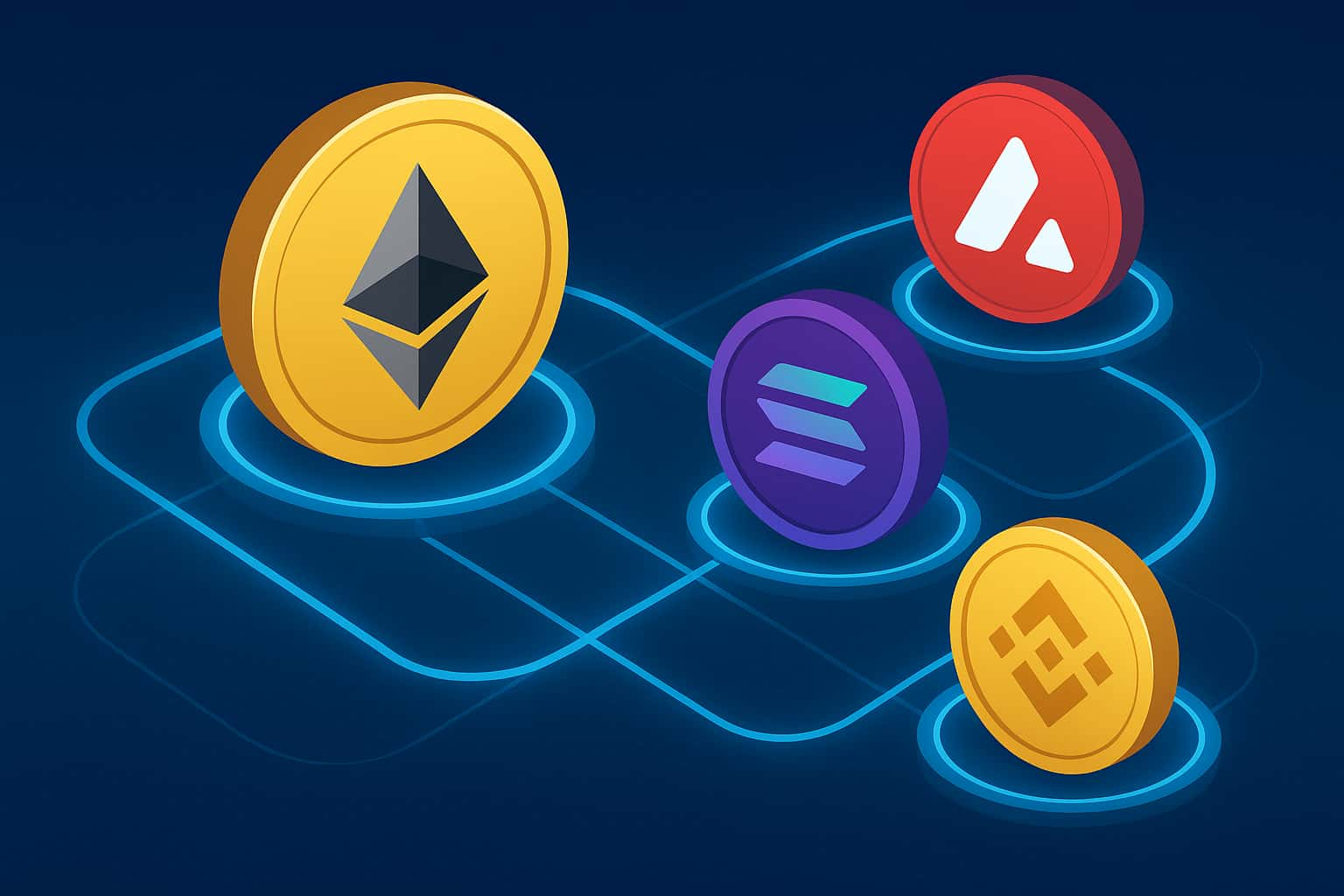-
In an increasingly interconnected world, supply chains have become global networks of manufacturers, distributors, logistics providers, and end customers. Ensuring transparency, security, and efficiency in these vast networks is a significant challenge for many B2B enterprises. Blockchain solutions development offers a modern solution. By leveraging the decentralized and tamper-evident capabilities of blockchain, supply chain stakeholders can gain real-time visibility and enhance trust across the entire value chain.
Introduction
Blockchain is a distributed ledger technology that enables secure, transparent, and immutable recordkeeping. Each transaction (or “block”) is chronologically linked to the previous one, creating a “chain” of information. In the context of supply chains, blockchain can track and verify the movement of goods, documents, and financial transactions from the point of origin to the final destination.
For B2B organizations, adopting blockchain in supply chain operations helps reduce manual efforts, mitigate fraud, and streamline data exchange across multiple partners.
Also, Read | How Blockchain Transforms the Supply Chain Finance
Key Features of Blockchain for Supply Chain
When integrating blockchain into supply chain operations, it's crucial to understand the core features that make it effective. Below are some primary attributes:
Decentralized Ledger
A blockchain-based system does not rely on a single central authority. Instead, each participating node on the network holds a copy of the ledger, ensuring that no single entity can unilaterally alter the records.
Immutability
Once data is recorded on the blockchain, it cannot be tampered with or removed. This immutability is a critical advantage in a supply chain, where data integrity is essential for compliance, audits, and tracking.
Transparency
Blockchain offers a highly transparent system. With proper permissions, all participants can view the history of transactions or product movements. This transparency fosters trust between suppliers, manufacturers, and logistics partners.
Smart Contracts
Smart contracts are self-executing pieces of code that automatically trigger transactions or actions when predefined conditions are met. In supply chains, they can automate routine processes like payment settlements, order confirmations, or inventory restocks.
Security
Blockchain employs advanced cryptographic techniques to secure transactions, making it difficult for unauthorized parties to manipulate the data. This security extends to financial transactions, sensitive product data, and intellectual property.
Also, Check | Top 6 Blockchain Use Cases in Supply Chain Management in 2024
Top Use Cases of Blockchain in Supply Chain
Blockchain technology revolutionizes how businesses handle traceability, monitoring, and authenticity in their supply chains. Below are some practical B2B use cases demonstrating its potential:
Product Traceability and Authenticity
Tracking the origins and journey of raw materials is critical in industries such as pharmaceuticals, food and beverages, and luxury goods. Using blockchain, companies can:
- Record each step of a product's journey from the source.
- Verify authenticity and prevent counterfeiting.
- Comply with regulatory requirements for product safety.
Real-Time Shipment Tracking
Logistics providers face numerous challenges, including shipment delays and lost goods. Blockchain-integrated IoT sensors can provide real-time updates on location, temperature, and other key metrics:
- Track environmental conditions for sensitive products (e.g., vaccines).
- Enable precise delivery timelines and reduce costly delays.
- Improve accountability among transport partners.
Automated Compliance and Audits
Regulatory compliance is indispensable in sectors like healthcare, automotive, and aerospace. By storing compliance records on an immutable blockchain:
- Audits become faster and more accurate.
- Entities can maintain detailed records of all transactions.
- Regulatory agencies have quick access to authentic data.
Supplier Management
Successful supply chains often rely on a vast network of vendors and contractors. Blockchain can enhance visibility and accountability by:
- Providing a complete record of vendor qualifications and performance.
- Ensuring timely payments and contract adherence via smart contracts.
- Identifying potential bottlenecks or supplier risks early on.
Inventory Management and Forecasting
Manufacturers depend on accurate inventory forecasts and effective replenishment strategies. Blockchain technology can connect various data points in real time:
- Consolidate sales forecasts, vendor lead times, and production needs.
- Enhance visibility into current and in-transit stock levels.
- Trigger automated re-ordering and alerts for stock shortages.
Also, Explore | How to Create a Simple Supply Chain Smart Contract
Advantages of Adopting Blockchain in Your Supply Chain
Implementing blockchain can transform how B2B enterprises handle their supply chain processes. Below are some key benefits:
Enhanced Transparency
Because all authorized participants can view transactions, blockchain fosters a culture of openness. Miscommunications and data discrepancies are minimized, leading to stronger business relationships.
Reduced Fraud and Errors
With each transaction recorded on an immutable ledger, it becomes virtually impossible for bad actors to manipulate the data. This feature significantly reduces fraud, theft, and invoice discrepancies.
Improved Efficiency and Automation
Smart contracts automate many manual processes such as payment releases and product inspections. This reduces operational overhead, speeds up workflows, and ensures smoother transactions.
Better Supplier and Customer Trust
In a blockchain-based ecosystem, every stakeholder—from raw material suppliers to end consumers—can have confidence in the accuracy of transaction records. Trust boosts collaboration and long-term partnerships.
Streamlined Regulatory Compliance
All relevant documentation (e.g., certifications, origin statements, shipping manifests) can be securely stored on the blockchain. This vastly simplifies audits and ensures that compliance requirements are met in a timely manner.
Overcoming Challenges
Although blockchain technology offers significant advantages, several challenges may arise:
Integration with Legacy Systems
Many B2B enterprises rely on legacy ERP and supply chain management systems. Integrating these with blockchain requires robust APIs, middleware solutions, and careful data mapping.
Scalability and Network Performance
Public blockchains (like Ethereum) can have limited throughput and higher latency compared to traditional databases. Private or permissioned blockchains often solve this but may sacrifice some of the decentralization benefits.
Regulatory Uncertainty
In some regions, regulations for blockchain are still evolving. Organizations must keep abreast of local compliance rules and adapt their systems accordingly.
Cost Implications
Building and maintaining a blockchain network can be expensive, especially when adding IoT sensors or integrating multiple enterprise systems. A clear ROI assessment is essential before large-scale deployment.
Also, Discover | Blockchain in Supply Chain : Tracing From Food to Healthcare
Best Practices for Successful Implementation
Identify Clear Use Cases
Before deploying blockchain, pinpoint specific pain points that the technology can address—whether it's authenticity, compliance, or real-time tracking. A targeted approach helps ensure a high return on investment.
Collaborate with Industry Stakeholders
Blockchain solutions are most effective when multiple participants are on board. Engage suppliers, logistics partners, and customers early in the process to ensure seamless adoption and consistent data standards.
Leverage Pilot Projects
Start with a small-scale project to test blockchain's feasibility in your specific context. Collect insights, measure performance metrics, and refine your strategy before a full-scale rollout.
Ensure Data Quality and Security
Garbage in, garbage out still applies. Make certain that data fed into the blockchain (via sensors or manual entry) is accurate and that robust security protocols guard against data breaches.
Stay Agile and Compliant
Given the evolving regulatory environment, your blockchain strategy should remain agile. Regular audits and compliance checks are critical to avoid unexpected legal hurdles.
You might be interested in | Blockchain Meets Mining Supply Chain for End-to-End Tracking
FAQ
Is blockchain suitable for all types of supply chains?
Blockchain can offer value to most supply chain models, particularly those requiring transparency, traceability, and multi-party collaboration. However, for simpler or fully internal supply chains, traditional database solutions may suffice.
What are the main cost factors for implementing blockchain?
Key cost drivers include setup of the blockchain platform, integration with existing ERP or SCM systems, and the addition of IoT devices for real-time data capture. Organizations should also factor in ongoing maintenance and support.
How does data privacy work on a blockchain network?
Enterprises can use permissioned blockchains, where only authorized participants have access to confidential data. Advanced cryptographic techniques like zero-knowledge proofs can further enhance privacy without sacrificing transparency.
What role do smart contracts play in the supply chain?
Smart contracts automate various processes, from triggering shipments to settling payments once goods arrive. They reduce manual checks and paperwork by executing predefined rules automatically.
Can blockchain integration help with sustainability initiatives?
Yes. By tracking raw materials and finished products, blockchain can verify the sustainability claims of suppliers. This transparency aids in meeting corporate social responsibility (CSR) goals and environmental regulations.
Conclusion
Blockchain technology holds immense potential for reshaping how B2B enterprises manage their supply chains. Through its core features— transparency, security, immutability, and smart contracts—blockchain can bring unprecedented levels of efficiency, trust, and collaboration. While challenges such as integration costs and regulatory uncertainties exist, careful planning and a phased implementation strategy can pave the way for a robust, future-proof supply chain.
As more organizations recognize the strategic advantages of blockchain, we can expect an industry-wide shift toward decentralized ledgers as the new standard for supply chain management. Adopting blockchain now positions your business as a forward-thinking leader, ready to innovate and excel in a rapidly changing global market. If you are looking to revamp the supply chain of your business network by leveraging the potential of blockchain technology, consider connecting with our blockchain developers to get started.

Our Offices
INDIA
Emaar Digital Greens, Sector 61,
Gurugram, Haryana
122011.
Welldone Tech Park,
Sector 48, Sohna road,
Gurugram, Haryana
122018.














